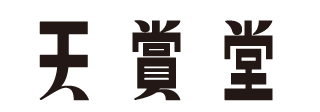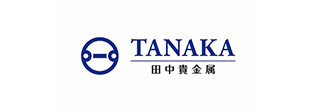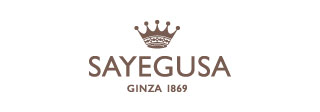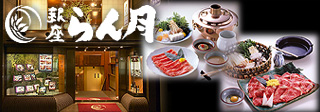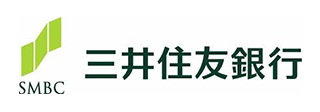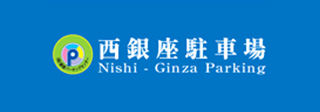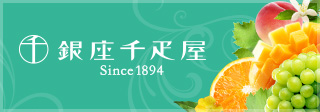
GINZA CONNECTIVE
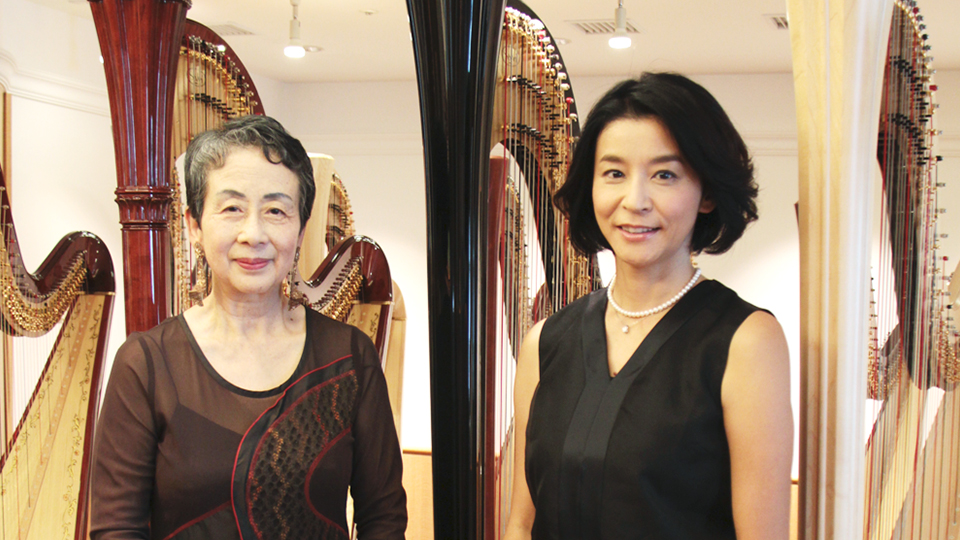
GINZA CONNECTIVE VOL.39
Chieko Nakamura ×Chisako Takashima
2014.12.04
An interview series featuring Ginza people in conversation with violinist Chisako Takashima. With a special fondness for Ginza, where she has many memories from both her professional and private life, Takashima explores Ginza from various dimensions with her guests. In this volume, she welcomes Ms. Chieko Nakamura CEO of Ginza Jujiya, a retailer of western musical instruments established in the Meji era.
First established as a bookstore, Ginza Jujiya proudly celebrates 140 years of history
- Takashima
- May I ask when Ginza Jujiya was first established?
- Nakamura
- Ginza Jujiya was established in Meiji 7 (1874). This year, we are celebrating 140 years of business here in Ginza San-chome. We originally started out as a bookstore that sold bibles and hymn books.
- Takashima
- Really!
- Nakamura
- The lifting of the ban on Christianity in Meiji 6 (1873) enabled us to openly promulgate our faith. The bible and hymns were essential in our promulgation activities and hence, we sold them at our store.
- Takashima
- I see. Then, the name Jujiya must come from…
- Nakamura
- The name Jujiya comes from the Christian jujika (=cross). We eventually came to sell organs, which are essential to singing hymns. Later, we imported accordions, mandolins, harmonicas and other musical instruments that were not yet widely available in Japan.
- Takashima
- So, you were constantly introducing new things.
- Nakamura
- Yes, we were. I have been told that when we displayed the first jukebox in Japan, people formed long queues outside our store.
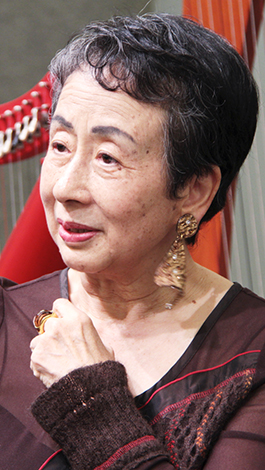
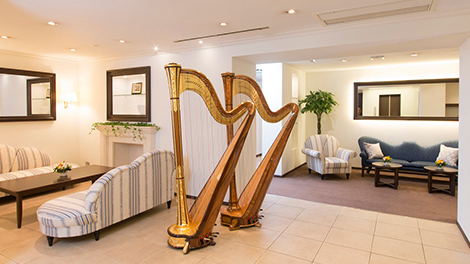
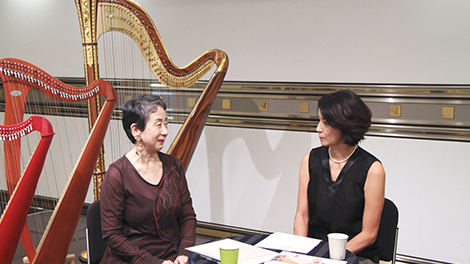
We organize lessons and concerts in an effort to share the beauty of the harp, a healing instrument
- Takashima
- I have heard that Ginza Jujiya is currently very focused on the harp.
- Nakamura
- Yes. In an era when various things have become widespread, I felt that people were not yet familiar with the harp. In an effort to invite more people to play the instrument, we have been giving harp lessons for almost 60 years now, but when we renewed our music classes eight years ago, we decided to enhance our focus on the harp.
- Takashima
- Do you also take harp lessons?
- Nakamura
- I have taken a few lessons in the past because I love listening to harp music and I wanted to learn to play.
- Takashima
- What do you think are the most fascinating features of the harp?
- Nakamura
- The harp has a beautiful form and an elegant sound. When you play the harp, you let it rest on your shoulder, which allows you to feel its beautiful sound pleasantly vibrate through your entire body. I believe it to be a healing instrument.
- Takashima
- You also offer free admission to your weekly concerts, held on Wednesdays, in order to share the beauty of the harp with a wide audience.
- Nakamura
- Yes, I’m very pleased to say that we have held over 400 concerts. We have arranged a diversity of harp concerts in many different styles, including duets with other instruments, such as the flute and violin. Welcoming a wide range of musicians – from young to experienced artists – all of our concerts have been very successful. Through our concerts, I hope to further acquaint our audience with harp music.
- Takashima
- I just recalled the first time I heard live harp music. It was when I was in second grade and I had been invited to dinner at my friend’s house. Her mother was playing the harp slowly….and we had waffles for dessert. Waffles, as we listened to harp music … I was simply amazed. As a child, I remember thinking, “What is going on here?” (laughs)
- Nakamura
- The music must have beautiful. (laughs)
- Takashima
- What are your ambitions for the future?
- Nakamura
- I would like to have more and more people get to know the harp, and so I am inspired to expand my activities outward. We currently offer harp classes at some schools, and give concerts at nursing homes as well as mini concerts at restaurants. I believe we have been successful in offering more opportunities than people have had in the past to listen to harp music.
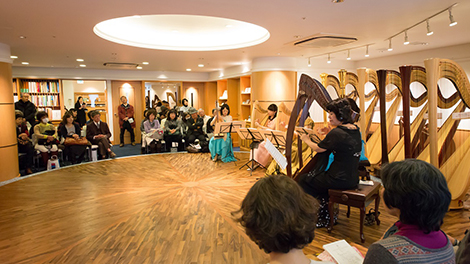
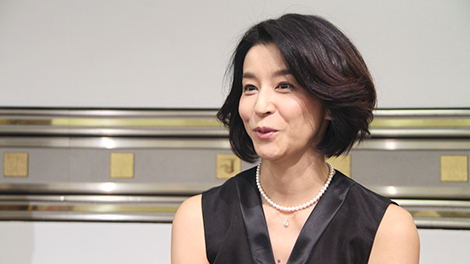
1 2
All List
- GINZA CONNECTIVE VOL.0 Ryo Sayegusa×Chisako Takashima
- GINZA CONNECTIVE VOL.1 Toshiyuki Kosaka×Chisako Takashima
- GINZA CONNECTIVE VOL.2 Yasuharu Mizuhara×Chisako Takashima
- GINZA CONNECTIVE VOL.3 Hitoshi Ishihara×Chisako Takashima
- GINZA CONNECTIVE VOL.4 Shinji Hara×Chisako Takashima
- GINZA CONNECTIVE VOL.5 Choichiro Motoyama×Chisako Takashima
- GINZA CONNECTIVE VOL.6 Noriko Okazoe×Chisako Takashima
- GINZA CONNECTIVE VOL.7 Choichiro Motoyama×Chisako Takashima
- GINZA CONNECTIVE VOL.8 Sayuri Yamaguchi×Chisako Takashima
- GINZA CONNECTIVE VOL.9 Yoshiki Tani×Chisako Takashima
- GINZA CONNECTIVE VOL.10 Yoshifumi Itoh×Chisako Takashima
- GINZA CONNECTIVE VOL.11 Kunihiko Miwa×Chisako Takashima
- GINZA CONNECTIVE VOL.12 Shin Watanabe×Chisako Takashima
- GINZA CONNECTIVE VOL.13 Akihiko Tsuda×Chisako Takashima
- GINZA CONNECTIVE VOL.14 Rie Horikawa×Chisako Takashima
- GINZA CONNECTIVE VOL.15 Jun Takahashi×Chisako Takashima
- GINZA CONNECTIVE VOL.16 Yusuke Harada×Chisako Takashima
- GINZA CONNECTIVE VOL.17 Lintaro Mizuhara×Chisako Takashima
- GINZA CONNECTIVE VOL.18 Keisuke Anzai×Chisako Takashima
- GINZA CONNECTIVE VOL.19 Hozu Yamamoto×Chisako Takashima
- GINZA CONNECTIVE VOL.20 Koji Shibata×Chisako Takashima
- GINZA CONNECTIVE VOL.21 Kayo Hosono×Chisako Takashima
- GINZA CONNECTIVE VOL.22 Mitsuru Saito×Chisako Takashima
- GINZA CONNECTIVE VOL.23 Akihisa Kawaguchi×Chisako Takashima
- GINZA CONNECTIVE VOL.24 Mamoru Sugiyama×Chisako Takashima
- GINZA CONNECTIVE VOL.25 Michiaki Kumagai×Chisako Takashima
- GINZA CONNECTIVE VOL.26 Shinichi Tanizawa×Chisako Takashima
- GINZA CONNECTIVE VOL.27 Koichi Suzuki×Chisako Takashima
- GINZA CONNECTIVE VOL.28 Munehito Matsuzaki×Chisako Takashima
- GINZA CONNECTIVE VOL.29 Hiroshi Hara × Chisako Takashima
- GINZA CONNECTIVE VOL.30 Shigeyuki Ando×Chisako Takashima
- GINZA CONNECTIVE VOL.31 Yukichi Ishikura × Chisako Takashima
- GINZA CONNECTIVE VOL.32 Seiko Yamada × Chisako Takashima
- GINZA CONNECTIVE VOL.33 Mami Nagai × Chisako Takashima
- GINZA CONNECTIVE VOL.34 Ryuta Takahashi × Chisako Takashima
- GINZA CONNECTIVE VOL.35 Kazumasa Osumi×Chisako Takashima
- GINZA CONNECTIVE VOL.36 Masahiro Kameoka×Chisako Takashima
- GINZA CONNECTIVE VOL.37 Shoichiro Watanabe×Chisako Takashima
- GINZA CONNECTIVE VOL.38 Keiji Niimoto×Chisako Takashima
- GINZA CONNECTIVE VOL.39 Chieko Nakamura ×Chisako Takashima
- GINZA CONNECTIVE VOL.40 Atsushi Yamane×Chisako Takashima
- GINZA CONNECTIVE VOL.41 Masaya Shibuya×Chisako Takashima
- GINZA CONNECTIVE VOL.42 Makoto Suzuki×Chisako Takashima
- GINZA CONNECTIVE VOL.43 Masaya Konaka×Chisako Takashima
- GINZA CONNECTIVE VOL.44 Masakazu Tanaka×Chisako Takashima
- GINZA CONNECTIVE VOL.45 Koko Kameoka × Chisako Takashima
- GINZA CONNECTIVE VOL.46 Jin Hirayama×Chisako Takashima
- GINZA CONNECTIVE VOL.47 Takashi Hoshihara×Chisako Takashima
- GINZA CONNECTIVE VOL.48 Mikiko Kimura × Chisako Takashima
- GINZA CONNECTIVE VOL.49 Keisuke Okamoto×Chisako Takashima
- GINZA CONNECTIVE VOL.50 Akira Ito × Chisako Takashima
- GINZA CONNECTIVE VOL.51 Tatsuhiko Adachi × Chisako Takashima
- GINZA CONNECTIVE VOL.52 Masahiko Yamano×Chisako Takashima
- GINZA CONNECTIVE VOL.53 Kiyoshi Kanazashi×Chisako Takashima
- GINZA CONNECTIVE VOL.54 Noriyuki Tsuji×Chisako Takashima
- GINZA CONNECTIVE VOL.55 Shoichi Kobayashi×Chisako Takashima
- GINZA CONNECTIVE VOL.56 Isao Nanjo×Chisako Takashima
- GINZA CONNECTIVE VOL.57 Shinobu Mitsuoka×Chisako Takashima
- GINZA CONNECTIVE VOL.58 Motoyoshi Yasuda×Chisako Takashima
- GINZA CONNECTIVE VOL.59 Toru Fujiki×Chisako Takashima
- GINZA CONNECTIVE VOL.60 Yuji Ida×Chisako Takashima
- GINZA CONNECTIVE VOL.61 Hitoshi Miki×Chisako Takashima
- GINZA CONNECTIVE VOL.62 Takehiko Furuya× Chisako Takashima
- GINZA CONNECTIVE VOL.63 Naoki Yoshizawa×Yusuke Yoshizawa×Chisako Takashima
- GINZA CONNECTIVE VOL.64 Kazuhito Kawase × Chisako Takashima
- GINZA CONNECTIVE VOL.65 Toshiji Yuki× Chisako Takashima
- GINZA CONNECTIVE VOL.66 Hikoyuki Yamaguchi×Chisako Takashima
- GINZA CONNECTIVE VOL.67 Daisuke Nagano×Chisako Takashima
- GINZA CONNECTIVE VOL.68 Shuichi Motohashi× Chisako Takashima
- GINZA CONNECTIVE VOL.69 Shinpei Tonaka×Chisako Takashima
- GINZA CONNECTIVE VOL.70 Shinya Kanematsu × Sachiko Takashima
- GINZA CONNECTIVE VOL.71 Masataka Yano×Chisako Takashima
- GINZA CONNECTIVE VOL.72 Mitsuhiro Kurokawa× Chisako Takashima
- GINZA CONNECTIVE VOL.73 Ryo Saegusa×Chisako Takashima
